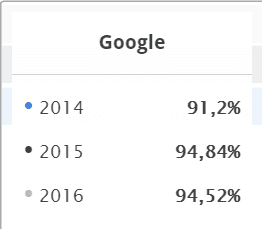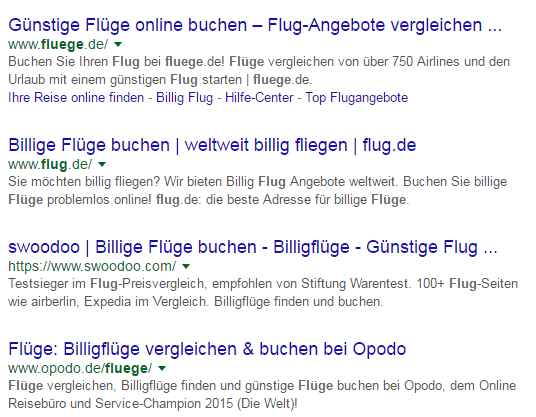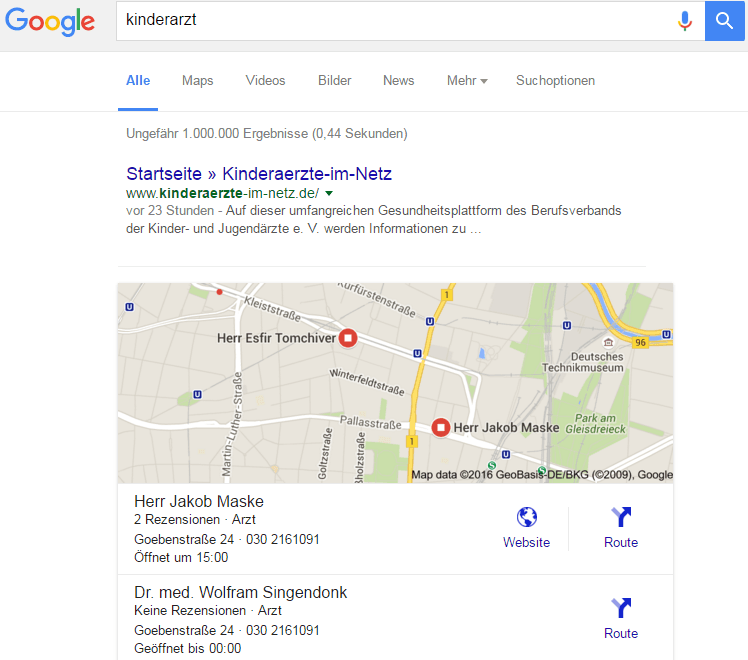
Blog Post
SEO

Nadine
Wolff
published on:
07.04.2016
One Search Query - Many Results: When Google Personalizes Search Queries
Table of Contents
Have you noticed that if you make the same search query multiple times on Google, you might see different results? If this happens, then you are being shown personalized search results. With personalized search, Google tries to show you the most relevant websites for your query. This article explores how exactly Google does that. Here's a little spoiler: There is no ONE search results page.
Google customizes the search results individually
There are many search engines, but with a market share of just under 95 percent, Google has formed the undisputed monopoly in Germany for years. When users are unsure about questions or seek detailed information, they typically turn to Google. The displayed results often show the pages that you have already used and valued for a long time. Google tracks both the queries you make and the ads you click on. Through this practice, Google tries to predict which search results might be most relevant for you on future search queries on a specific topic.

Figure 1: Market share for the use of online search engines in Germany; Source: Statista
But how can this be? How can Google know what makes you tick and which websites are most relevant to your search query?
Google utilizes what is known as personalized search. To present you with the best possible search results, information about the searcher is collected and analyzed. A first important point of contact is your past search queries. In addition to the search history, these include the data stored in the Google+ social network, including your circle of contacts. Before displaying results, the queries of people connected with you are also analyzed because Google assumes that your friends and acquaintances have similar interests to you.
Your past search queries are stored in the web history. At the moment you make the search query, a cookie is set for you. This is a small file that the website you visited saves on your computer and remains active for 180 days. Information such as the preferred language and certain site settings can now be considered by the website. It doesn't matter whether you are logged into Google in any way at the time.
The web history generated influences the ranking of the displayed search results actively. For example, if you have searched for flights frequently in the past and clicked on the comparison portal swoodoo.com multiple times in the results, Google remembers this behavior and knows that you prefer researching on Swoodoo instead of fluege.de.

Figure 2: Example search result on Google: Search for "Flights"
The consequence is that in a later search, the comparison portal Swoodoo will be displayed at a higher position than other sites. Initially, the SEO optimization of the website operators is secondary in the display. However, those who optimize their site and provide good content for users are frequently clicked. Those who are frequently clicked will reach higher positions in search results despite personalized search.
Consideration of location and browser usage in search queries
In addition to the information Google receives from the web history and your personally entered data, the current location where you are plays a significant role in the listing of search results.
The standard IP address (IPv4) is a sequence of four numbers, each of which can be between 0 and 255, separated by periods. The general IP address makes a device reachable and localizable. For example, the following information is transmitted via the address code:
User's Internet provider
User's location
Through the IP address, Google learns from where you start your query. If you live in Berlin and search for a pediatrician, you will be shown search results in your immediate area without the need to explicitly state the location in the search query.

Figure 3: Local search results on Google
When search results are displayed, device recognition additionally considers which browser you're using for the query. For Mozilla Firefox, Internet Explorer, and Chrome, the results should not differ or differ only minimally. For queries conducted via the Safari browser, Google tends to favor Apple-compatible websites. Here, too, Google generates a significant added value for the user.
For businesses that primarily focus on regional customers (supermarket, doctor, bike shop, auto workshop), it's advisable to strengthen their business regionally and in their neighborhood through effective search engine optimization using so-called Local SEO. You can read about the proper implementation in our blog article "Local SEO – How to Get Found Locally with These Steps".
How you can prevent your search results from being personalized
If you don't want Google to refer to previous search queries, you have the option to regularly delete the web history. This can be done by opening the Web & App Activity and deleting the corresponding data. Google also provides a detailed guide on deleting search queries and browser activities.
Additionally, you can also edit the activity settings so that future search queries are no longer saved.
A third option is to surf the internet anonymously. Visited pages and downloads are then not stored by Google. To enable this, you can activate "Incognito Mode" in Chrome, "Private Mode" in Firefox, and "InPrivate Browsing" mode in Internet Explorer.
What we can do for you
The use of geographical data is particularly exciting in the field of search engine optimization. If you need support with Local SEO, feel free to contact us.

Nadine
Wolff
As a long-time expert in SEO (and web analytics), Nadine Wolff has been working with internetwarriors since 2015. She leads the SEO & Web Analytics team and is passionate about all the (sometimes quirky) innovations from Google and the other major search engines. In the SEO field, Nadine has published articles in Website Boosting and looks forward to professional workshops and sustainable organic exchanges.


